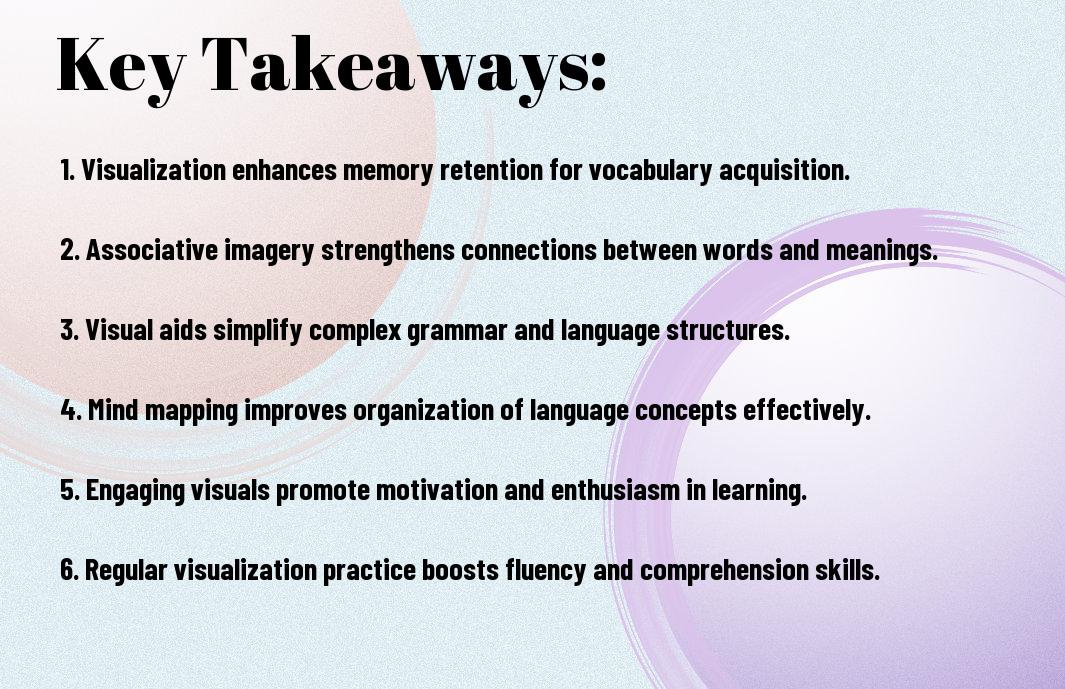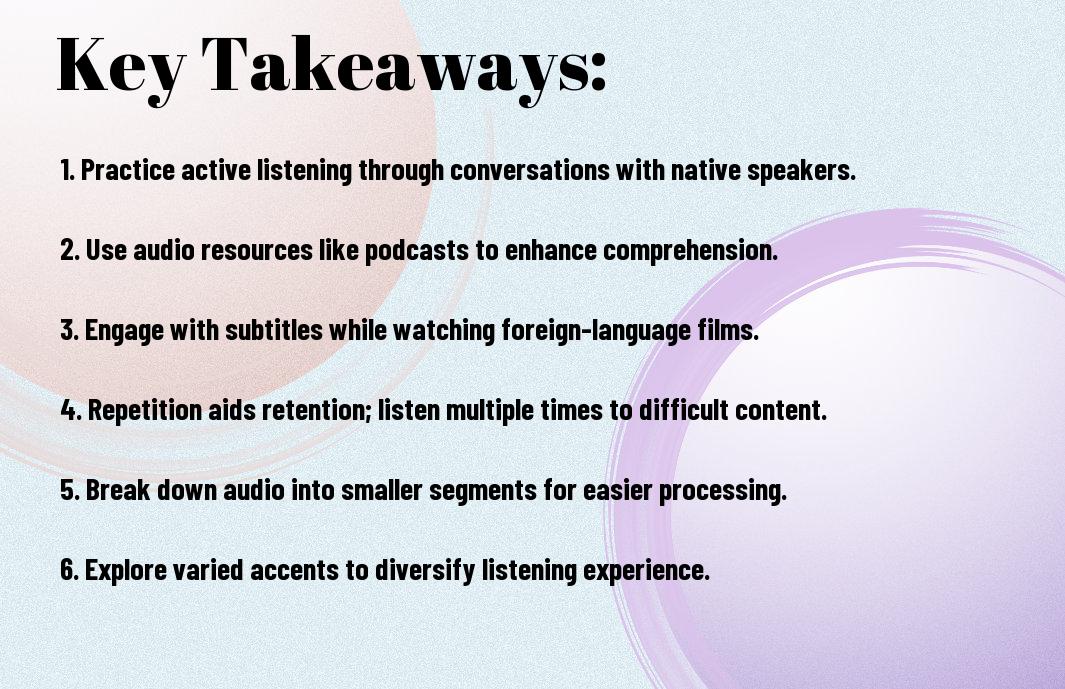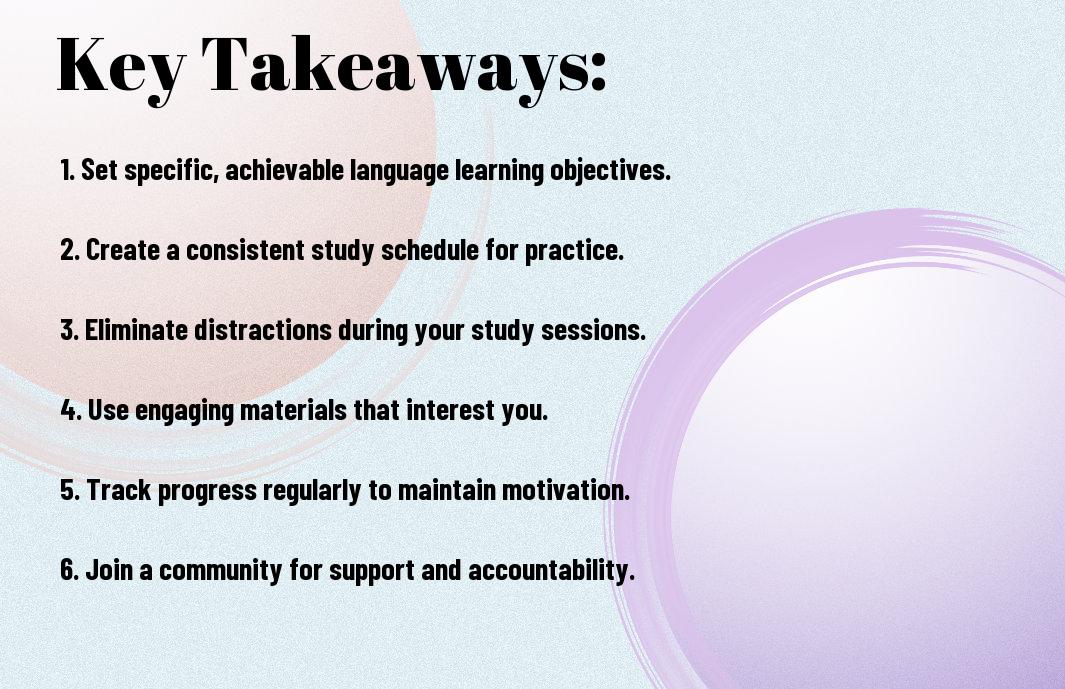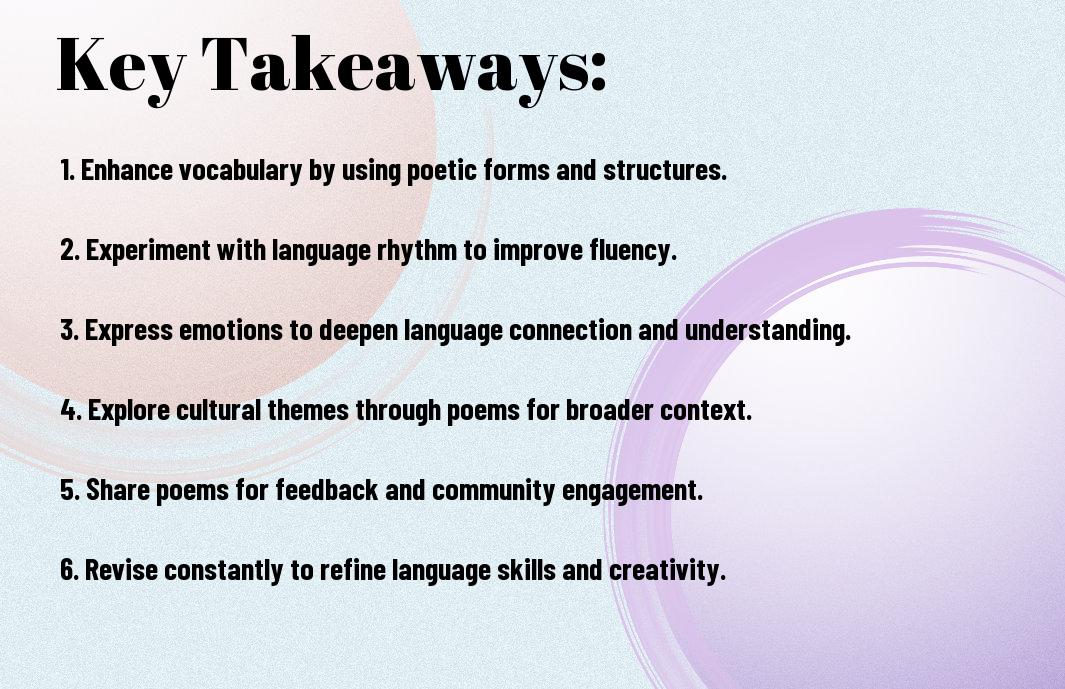As you begin on your language learning journey, you’ll encounter various methods and techniques to help you achieve your goal. You’ll need to assess your learning style and set realistic objectives to ensure steady progress. Your approach will depend on your motivation, available time, and the language you’ve chosen to learn. By understanding your strengths and weaknesses, you can create an effective plan to acquire your new language skills and stay motivated throughout the process.
Key Takeaways:
To start learning a language as a beginner, consider the following points:
- Set realistic goals and identify your motivation for learning the language to help you stay focused and motivated throughout the process.
- Choose the right resources, such as language learning apps, textbooks, or tutors, that fit your learning style and goals.
- Immerse yourself in the language by listening to native speakers, watching TV shows or movies, and speaking with language exchange partners to improve your pronunciation and comprehension.
- Focus on grammar rules and vocabulary building, starting with basic phrases and gradually increasing the complexity of the language as you progress.
- Practice consistent practice and try to use the language in your daily life, even if it’s just for a few minutes each day, to reinforce your learning and track your progress.
Setting Goals
Before you start learning a language, it’s vital to set achievable goals. This will help you stay motivated and focused on your progress. You need to define what you want to accomplish and by when, allowing you to track your success and make adjustments as needed.
Defining Motivation
For instance, figuring out why you want to learn a language is vital. You should ask yourself what drives your desire to learn, whether it’s for travel, work, or personal growth, and use this motivation to fuel your learning journey.
Creating a Study Plan
Around the time you set your goals, you should also create a study plan. You will need to determine how many hours you can dedicate to learning each week and what resources you will use to achieve your goals.
Consequently, as you create your study plan, you will need to consider your learning style, schedule, and available resources. You should prioritize consistency and flexibility, allowing you to make adjustments as you progress in your language learning journey, and ensuring that you stay on track to meet your goals.
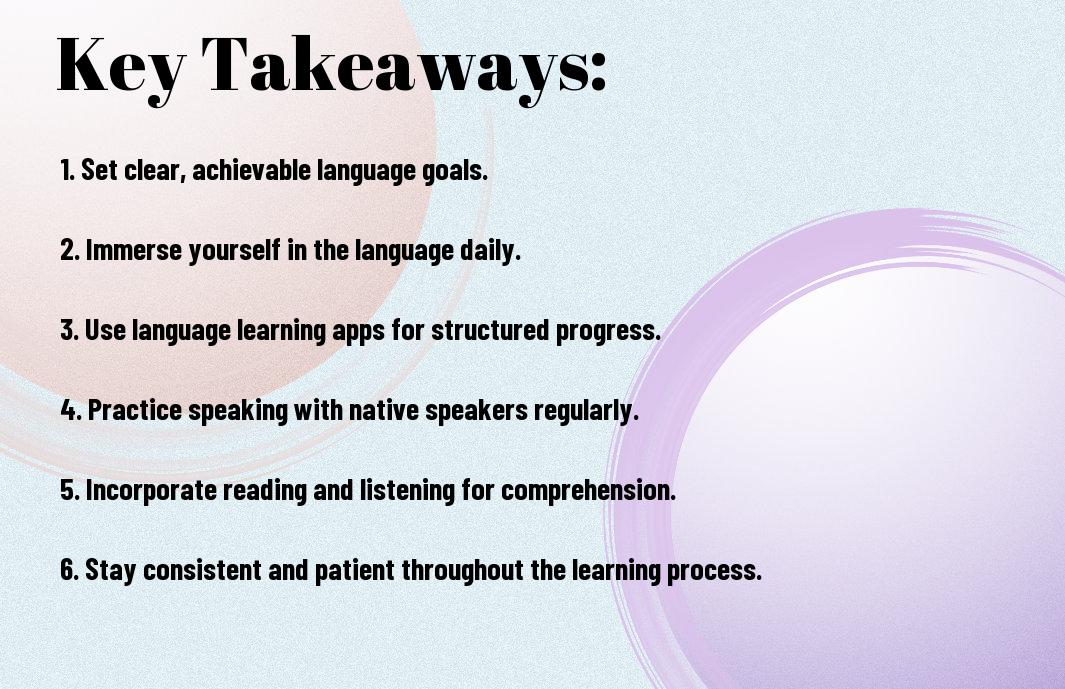
Choosing Resources
If you’re looking to learn a language, you’ll need to select the right resources to aid your learning journey. You can find helpful tips on how to quickly and efficiently learn a new language from experts and learners alike.
Language Learning Apps
Beneath the surface of language learning lies a wealth of apps designed to make learning easier. You’ll find a variety of language learning apps that cater to your learning style and goals.
Textbooks and Workbooks
For those who prefer a more traditional approach, textbooks and workbooks are effective tools for learning a language. You can use them to practice grammar, vocabulary, and reading comprehension at your own pace.
But as you investigate deeper into textbooks and workbooks, you’ll discover that they offer more than just practice exercises. They provide a structured approach to learning, allowing you to build a strong foundation in the language and track your progress over time, which will help you stay motivated and focused on your learning goals.
Building Foundations
To start your language learning journey, you need to establish a strong base. You will begin by learning the fundamentals, which will help you progress faster and more efficiently.
Learning Alphabet and Pronunciation
Alphabetically, your first step is to familiarize yourself with the language’s script and sound system. You will learn the correct pronunciation of each letter and how they combine to form words.
Basic Grammar Rules
For your language learning to be effective, you need to understand the basic grammar rules. You will start by learning the verb conjugations, noun declensions, and sentence structures that are necessary for communication.
Building on your knowledge of grammar rules, you will be able to construct simple sentences and engage in basic conversations. As you progress, you will learn more complex grammar rules, enabling you to express yourself more accurately and confidently in your target language.
Immerging in the Language
After deciding to learn a language, you need to surround yourself with it. Listen to music, watch TV shows and movies, and try to speak with native speakers to get used to the sound and structure of the language.
Listening and Speaking
To improve your listening and speaking skills, try to engage in conversations with native speakers, either in person or online, and focus on understanding different accents and pronunciations.
Reading and Writing
Similar to speaking, writing and reading are important skills to master. You can start by reading simple texts, such as news articles or children’s books, and writing short paragraphs about your daily life.
Language learners like you will find that reading and writing are skills that complement each other. As you read more, you will improve your writing, and vice versa. You can practice writing by keeping a journal or writing short stories, and as you progress, you will notice significant improvement in your overall language skills.
Practicing Consistently
Keep in mind that consistency is key when learning a language. You can find helpful tips on How to Learn a New Language: Tips for Beginners to aid your journey.
Setting a Routine
Normally, one of the most effective ways to ensure consistent practice is to set a routine, where you dedicate a specific time each day to language learning, allowing you to make steady progress and stay motivated.
Overcoming Obstacles
Generally, by staying committed and seeking help when needed, you can overcome the challenges that come with language learning, such as difficulty with grammar or pronunciation, and stay on track to achieving your goals.
Obstacles will inevitably arise during your language learning journey, and you will need to develop strategies to work through them, such as finding a language partner or tutor, using online resources, or adjusting your study schedule, which will help you stay focused and motivated to continue learning and improving your language skills.

Evaluating Progress
Not monitoring your progress can hinder your language learning journey, so it’s necessary to track your development regularly. This helps you identify areas that need improvement and make informed decisions about your study plan.
Tracking Improvement
Betwixt regular assessments, you’ll be able to gauge your progress, celebrating small victories and addressing weaknesses. This will help you stay motivated and focused on your goals.
Adjusting the Study Plan
With each evaluation, you’ll have the opportunity to reassess your strategy and make adjustments as needed. This allows you to optimize your learning approach, ensuring you’re making the most of your time and effort.
In fact, adjusting your study plan is an ongoing process that requires your active involvement. As you progress, you’ll discover new areas of interest or difficulty, and your plan should reflect these changes. By being flexible and adaptable, you’ll be able to tailor your learning approach to your unique needs and goals, ultimately achieving greater success in your language learning journey.
Summing up
Considering all points, you now have a clear understanding of how to learn a language as a beginner. You can start by setting achievable goals and creating a study schedule that suits your lifestyle. As you progress, your language skills will improve, and you will become more confident in your ability to communicate effectively in your target language, making your learning journey successful and enjoyable.
FAQ
Q: What are the best resources for a beginner to learn a new language?
A: As a beginner, it’s crucial to start with the basics and build a strong foundation. Some of the best resources to learn a new language include language learning apps such as Duolingo, Babbel, and Rosetta Stone, which offer interactive lessons and exercises to help you get started. Additionally, language exchange websites, podcasts, and YouTube channels can provide valuable learning materials and opportunities to practice speaking and listening skills. You can also try language learning books, textbooks, and online courses that cater to your learning style and goals.
Q: How can I stay motivated and track my progress while learning a new language?
A: Staying motivated is a significant part of the language learning process. To track your progress, set achievable goals and milestones, and celebrate your successes along the way. Find a language learning buddy or join a language exchange community to practice speaking with native speakers and get feedback on your progress. You can also use language learning journals or apps to track your daily practice, vocabulary acquisition, and grammar mastery. Setting realistic goals and rewarding yourself for reaching them can help you stay motivated and engaged in the learning process.
Q: What are some effective language learning strategies for beginners to improve their speaking and listening skills?
A: To improve your speaking and listening skills as a beginner, focus on immersion and practice. Listen to native speakers, podcasts, and audiobooks in the target language to get used to the sounds, rhythms, and intonation. Watch TV shows and movies with subtitles in the target language to improve your listening and comprehension skills. Practice speaking with native speakers, either in person or online, to build your confidence and fluency. You can also try shadowing, which involves repeating what a native speaker says to improve your pronunciation and intonation. Consistency and practice are key to developing your speaking and listening skills in a new language.

